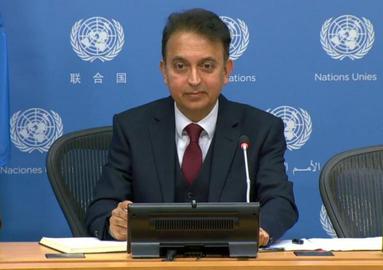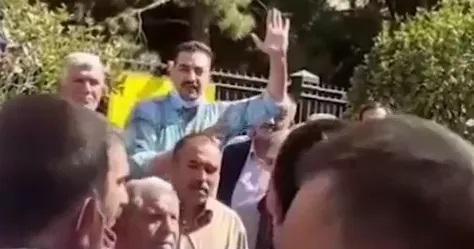On Friday, April 1, UN Human Rights Council renewed the mandate of Javaid Rehman, the UN Special Rapporteur on Human Rights in Iran, despite vocal opposition by the Islamic Republic. Rehman has never been allowed to visit Iran and Iranian government representatives have met him on just a handful of occasions outside the country.
The Human Rights Council is an inter-governmental body based in Geneva, responsible for monitoring the situation of human rights around the world. In a case where a member state is known to consistently violate international norms, the council can task an individual to follow up on the situation.
Rehman has had a difficult, at times explosive tenure. The recent resolution for extending his mandate was introduced by the United Kingdom and was adopted by a vote of 19 in favor, 12 against, and 16 abstentions.
Who is Javaid Rehman?
Javaid Rehman is a London-based, Muslim British-Pakistani legal scholar and the Professor of Islamic Law and International Law at Brunel University in London. He has been UN Special Rapporteur on Human Rights in Iran for close to four years now, since July 2018.
The extension of the mandate means that situation of human rights in the Islamic Republic remains a matter of pressing concern to the UN. The Islamic Republic, of course, has consistently opposed the appointment of special rapporteurs for Iran.
The primary focus of Rehman’s research has been torture, forced disappearances, arbitrary detention and terrorism linked to the Iranian state, as well as the abuse of women and minority groups and brutal state suppression of popular dissent. He has submitted tens of reports over the years, which portray a worsening situation even in a relatively short time-frame.
Rehman has also called for an independent inquiry into the country’s 1988 prison massacre and the role of Ebrahim Raisi, the current president of the Islamic Republic, in that extrajudicial slaughter. In his latest report, Rehman re-iterated this position.
The Islamic Republic has made its displeasure at Rehman’s re-appointment clear. In a statement, the Iranian judiciary’s so-called High Council of Human Rights declared that the vote “cannot be basis for cooperation and interaction and the Islamic Republic of Iran utterly rejects it.” Foreign Ministry Spokesman Saeed Khatibzadeh also rejected the resolution, claiming it had been drafted on no real basis by Britain and other Western countries, and was “devoid of any legal validity”.
How Did the UN Member States Vote?
In Favor (19) were: Argentina, Finland, France, Germany, Honduras, Japan, Lithuania, Luxembourg, Malawi, Marshall Islands, Mexico, Montenegro, Netherlands, Paraguay, Poland, Republic of Korea, Ukraine, United Kingdom, United States
Against (12) were: Armenia, Bolivia, China, Cuba, Eritrea, India, Indonesia, Kazakhstan, Pakistan, Russian Federation, Uzbekistan, Venezuela
The Abstentions (16) included: Benin, Brazil, Cameroon, Cote d’Ivoire, Gabon, Gambia, Libya, Malaysia, Mauritania, Namibia, Nepal, Qatar, Senegal, Somalia, Sudan, United Arab Emirates (UAE)
Javaid Rehman’s Predecessors in Iran
In its 43-year history to date, the Islamic Republic has been almost continuously monitored by UN special rapporteurs as a result of its structural, pervasive and unflinching violations of the human rights of Iranians. In the 1980s the job fell first to Andrés Aguilar from Venezuela and Reynaldo Galindo Pohl from El Salvador. From 1995 to 2002, Maurice Copithorne, a Canadian lawyer, was the special rapporteur for human rights in Iran.
From 2002 to 2011, most of it falling during the presidency of Mohammad Khatami, no special rapporteur was appointed for Iran. But for the past 11 years UN special rapporteurs have been monitoring the situation anew. Ahmed Shaheed, former foreign minister of the Maldives, and Asma Jahangir, a human rights lawyer from Pakistan, were the next successors. Asma Jahangir unexpectedly died from cardiac arrest in 2018 and the brief was then handed to Javaid Rehman. All of them have been Muslims and experts on Islamic Sharia law, which the Islamic Republic claims to follow.
visit the accountability section
In this section of Iran Wire, you can contact the officials and launch your campaign for various problems



























comments